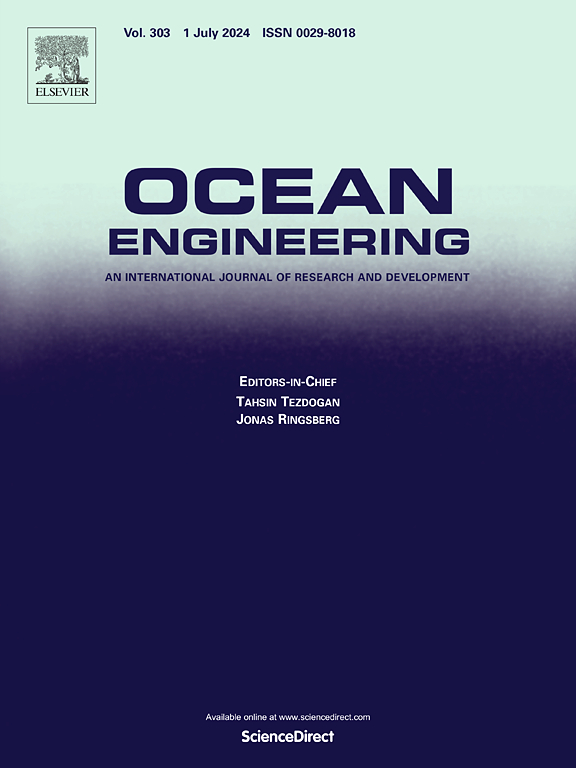A reinforcement learning-based control approach with lightweight feature for robotic fish heading control in complex environments: Real-world training
IF 4.6
2区 工程技术
Q1 ENGINEERING, CIVIL
引用次数: 0
Abstract
In complex and unpredictable ocean environments, reinforcement learning (RL) based intelligent control strategy holds significant potential for enhancing the survival and operation performance of robotic fish. Although it is well known that training RL-based control strategy in real-world environments possesses numerous advantages, yet achieving it remains significant challenges such as training approach and computational power. This paper proposes a RL-based lightweight control strategy for robotic fish heading direction control, which can be implemented on a compact control system (72 MHz) in the physical world. The control strategy integrates RL with a central pattern generator (CPG). Specifically, RL is employed for decision-making processes, whereas CPG plays a crucial role in action execution. Functional segregation within this framework enables low computational consumption while facilitating rapid convergence. The proposed control strategy is validated through the conduction of diverse directional swimming tests in a wire-driven robotic fish that is trained in a circulating water channel. The complex flow environment and the damaged caudal fin are incorporated into the tests, demonstrating the satisfactory generalization performance, robustness, and adaptability to unknown control scenarios in practical applications. The proposed control strategy exhibits approximately a enhancement in control accuracy and a notable improvement in stability compared to the traditional PID approach. This study offers a valuable reference for the development and implementation of RL-based control strategy in robotic fish, specifically for physical training and directional control during swimming.
复杂环境下机器鱼航向控制的轻量化强化学习控制方法:真实世界训练
在复杂和不可预测的海洋环境中,基于强化学习(RL)的智能控制策略对于提高机器鱼的生存和操作性能具有重要的潜力。虽然众所周知,在现实环境中训练基于强化学习的控制策略具有许多优势,但实现它仍然存在重大挑战,如训练方法和计算能力。本文提出了一种基于rl的机器鱼航向控制轻量化控制策略,该策略可以在物理世界中的紧凑控制系统(72 MHz)上实现。该控制策略将强化学习与中心模式发生器(CPG)相结合。具体而言,RL用于决策过程,而CPG在行动执行中起着至关重要的作用。此框架中的功能隔离在促进快速收敛的同时实现了低计算消耗。通过在循环水通道中训练的线驱动机器鱼进行不同方向的游泳测试,验证了所提出的控制策略。将复杂的流动环境和受损尾鳍纳入测试,在实际应用中显示了令人满意的泛化性能、鲁棒性和对未知控制场景的适应性。与传统的PID方法相比,所提出的控制策略在控制精度方面提高了约50%,在稳定性方面也有显著改善。该研究为机器鱼基于rl的控制策略的开发和实施,特别是在游动过程中的体能训练和方向控制方面提供了有价值的参考。
本文章由计算机程序翻译,如有差异,请以英文原文为准。
求助全文
约1分钟内获得全文
求助全文
来源期刊

Ocean Engineering
工程技术-工程:大洋
CiteScore
7.30
自引率
34.00%
发文量
2379
审稿时长
8.1 months
期刊介绍:
Ocean Engineering provides a medium for the publication of original research and development work in the field of ocean engineering. Ocean Engineering seeks papers in the following topics.
 求助内容:
求助内容: 应助结果提醒方式:
应助结果提醒方式:


